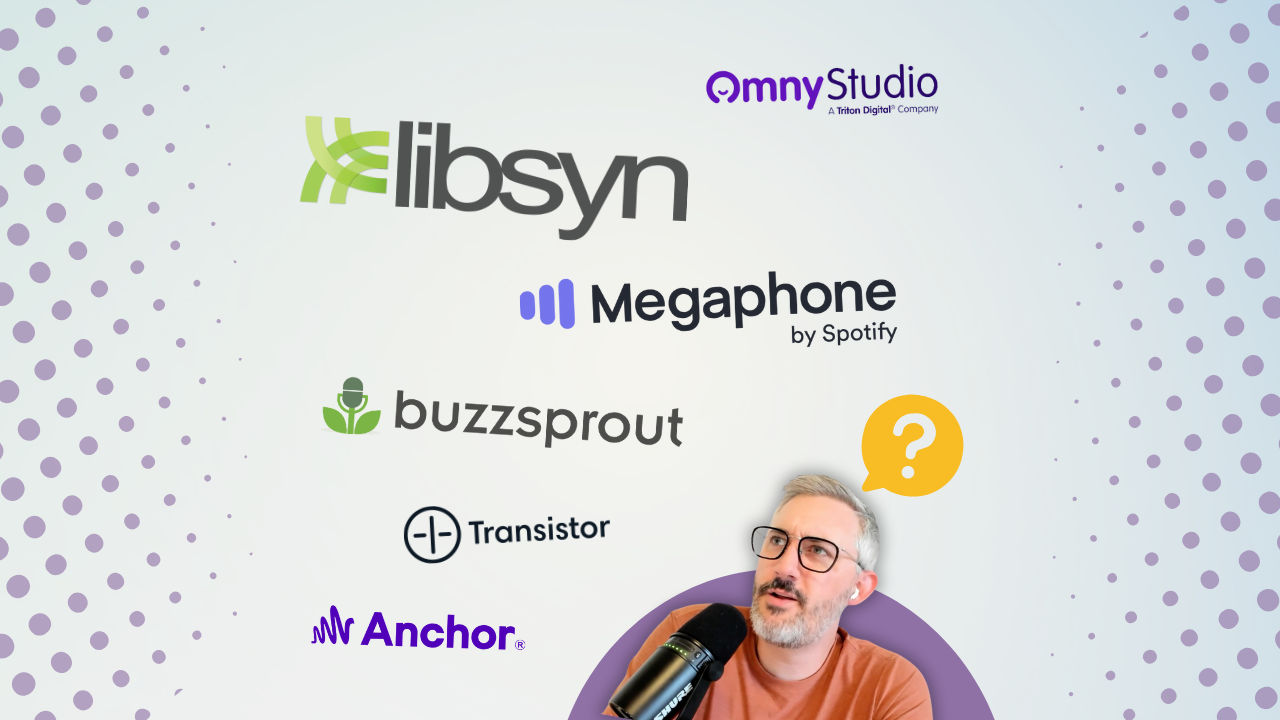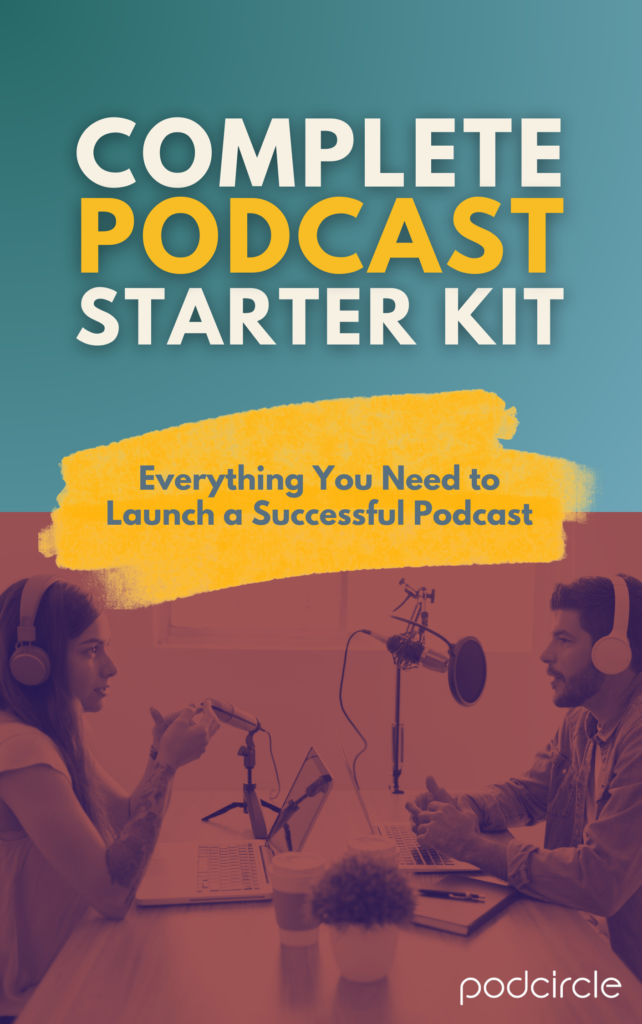Disclosure: We only endorse products and services that we’ve personally used or come highly recommended by trusted sources. If you grab anything we mention, we may get a small commission. However, there’s not extra cost to you.
If you want to start distributing your podcast across platforms like Spotify and Apple Podcasts, you need to use a podcast hosting platform.
But these platforms are more than just a mechanism for distributing your episodes. The right hosting platform can be a powerful tool that helps you grow your podcast.
And if you choose the wrong one? You may find yourself struggling to access the features you need, or wasting time trying to figure out how to navigate a clunky interface.
Today, we’ll compare 7 of the most popular podcast hosting platforms and let you know which one we recommend to 99% of our clients. We’ll also teach you about some of the most valuable features you can take advantage of within each platform.
Consider These Factors When Choosing a Podcast Hosting Platform
With so many hosting platforms to choose from, it can feel tempting to just pick the first one you hear of — maybe it’s recommended by a friend, or maybe it popped up first in your Google search.
But these platforms are not all created equal! Make sure to think carefully about the features you need today (or might need in the future as you grow). Some key questions to ask are:
- Is the user interface intuitive and easy to understand?
- Can I post audio episodes to my YouTube channel?
- Does the platform provide managed user access and roles, or will my team all have to use one login?
- Does the platform allow me to launch a basic website?
- What analytics are available?
- Do I need to launch a private podcast, and does the platform allow that?
- Can I publish video podcasts to Spotify?
- How are dynamic ads handled?
Even if you don’t need a particular feature now, you may want access to it in the future. Make sure to carefully consider the options available and pick the one that gives you the most flexibility as you grow.
Now Let's Talk About Dynamic Ads
Whether or not you currently run ads on your podcast, dynamic ads are a useful concept to understand. And more often than not, they play a major role in determining which podcast hosting platform is best for you.
For a more in-depth look at dynamic ads, check out this podcast episode:
But in the meantime, here’s a quick overview:
Dynamic ads are the future of podcast advertising because they allow you to insert ads into new or existing episodes. Simply record your ads, then set them up as an ad campaign in your hosting platform and choose which episodes you want them to appear in.
But these ads only work if you have a podcast hosting platform that supports them. So, if you currently advertise or think you might want to run ads in the future, make sure you’re considering dynamic ads capabilities as you compare these popular hosting platforms:
Breaking Down the Popular Hosting Platforms
1. Libsyn
While Libsyn may have been the first hosting platform on the market in 2004, they haven’t necessarily kept up with all the new features and innovations their competitors now offer. Their pricing model is incredibly outdated — it’s based on the file size of your monthly uploads — and the user experience is clunky and unintuitive. And while Libsyn does offer dynamic ads, they’re incredibly confusing to use.
2. Buzzsprout
Buzzsprout has a decent platform and user experience, but they have one very annoying feature that keeps us from fully recommending them. Buzzsprout charges extra for a feature called “Magic Mastering,” which sounds fancy, but basically just allows you to play your audio in stereo. They’re taking your audio — which is already recorded in stereo — reducing it to a mono file, and then charging you extra to restore it to the way it should be!
3. Simplecast
Simplecast has an excellent user interface and most of the features you could want or need. However, they don’t make the pricing for their dynamic ad management publicly available, and you have to have a Professional or Enterprise plan to access dynamic ads. So, if that’s something you’re interested in, you may want to explore another platform.
4. Omny Studios
Omny is a powerful hosting platform for advanced ad targeting, but it’s more than 99% of podcasters will ever need. While it’s popular with large podcast networks looking to run ads across multiple shows, it may not be worth your investment when you’re just starting out or hosting only one podcast.
5. Spotify for Podcasters (previously called Anchor)
Spotify recently rebranded the free platform Anchor as their own Spotify for Podcasters hosting service. This platform is very basic, but provides access to some exciting Spotify features like in-app video streaming, listener Q&As, and polls. For more advanced features, including dynamic ad insertion, you’d need to upgrade to…
6. Megaphone
For podcasters looking for more features than Anchor can offer, Spotify also offers the paid platform Megaphone. Megaphone has a robust dynamic ads feature, including advanced targeting options like geotargeting. It’s important to keep in mind that the pricing is steeper than some competitors, starting at $99/month.
7. Transistor
If you’ve worked with Podcircle or listened to our podcast, then you probably won’t be surprised to hear that Transistor is the platform we recommend! Not only is it the easiest platform to start a podcast on (or transfer an existing podcast to), but it also offers a wide variety of features that podcasts of all sizes can benefit from, including:
-
- An easy-to-build basic website
- Private podcasts for internal use or for monetized content
- Managed user access with role-based permission
- Responsive, live customer support
- UNLIMITED podcasts
The starter plan starts at just $19/month, and for the $49/month professional plan, you can also access:
-
- Dynamic ads with simple, yet powerful interface
- Dynamic show notes
- Managed user access with role-based permission
- The ability to auto-post your audio episodes on YouTube
With a large suite of features and a price point most podcasters can afford, we’ve found that Transistor meets the needs of 99% of our clients. And even if you’re already using a different host, they make it incredibly easy to migrate your show to their platform.
To explore Transistor.FM for yourself, head to this link for a 14-day free trial. And if you want help figuring out how to migrate your show to a platform that has all the features you need, contact us below! We’ll help you figure out the best next step for your show.
Before you go! Download our Complete Podcast Starter Kit.
It includes:
✅ Podcircle’s Essential Equipment Guide
✅ The Ultimate Podcast Launch Checklist
✅ Content Calendar Template formatted for Google Sheets
✅ Remote Interview Preparation Pack
✅ 8 Tips to Improve Your Interviews PDF
✅ Three Steps to Writing a Compelling Podcast Show Description




